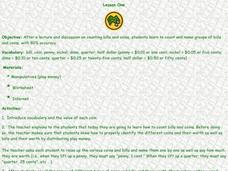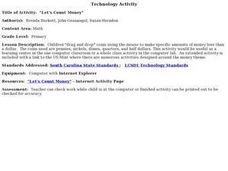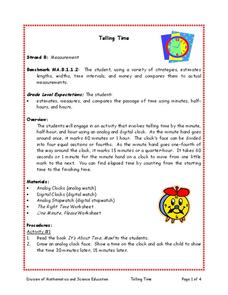Curated OER
Money
Students practice counting money. In this counting and comparing money lesson, students review the value of coins and use play money to count out five dollars. Students complete a worksheet to determine what items they could buy...
Curated OER
Understanding Fractions - Cookbook Comparisons
Learners explore equal fractions in relationship to a whole unit. They fold strips of paper into halves, thirds, etc. and compare them to the first strip which represents a "whole unit." Fractional parts are identified and compared.
Curated OER
Fractional Parts of a Number
In this fractional parts of a number worksheet, students read and solve 6 story problems that pertain to fractional parts of a whole number.
Curated OER
Math -- Money
Pupils identify a penny, nickel, dime, quarter and a half dollar. They examine the value of each coin and its equivalents (to quarter/dollar). After pairing up with a classmate, each one drills the other one on each coin.
Curated OER
The American Revolution: 1775-1783
Casting the American Revolution into a bright, informative light, this presentation details many key facts about the strategies and decision during the revolutionary campaigns. The latter half of the slides prompt viewers to examine why...
Curated OER
Count On It!
Students investigate money. In this consumer math lesson plan, students use coins, identify their value, then group them in various ways to equal a dollar.
Curated OER
Money 9.1
In this counting money worksheet, students complete several different exercises that help them understand money and how to count both cents and dollars.
Curated OER
Counting Money
Students learn how to count money. In this money lesson, students review the names and values for each coin. Students learn how to count bills and coins and how to write amounts of money. Students complete web activities including a...
Curated OER
Combining Coins to Make Equal Monetary Amounts
Third graders determine how to make equivalent amounts of money using different sets of coins. In this money lesson, 3rd graders review money vocabulary and coin values before determining how to count bills and coins in different sets to...
Curated OER
Money Math Carnival
Third graders explore money in a carnival format. In this money lesson, 3rd graders create a carnival of mathematics activities. Students determine the value of money in mixed amounts and explore how to create representations of money.
Curated OER
Money Makes the Fair-Go-Round
Young scholars explore the value of money. In this money lesson, students investigating combining amounts of money and making change. Young scholars count sets of money and make fair trades. Resources are provided.
EngageNY
Mid-Module Assessment Task: Grade 8 Module 6
Make sure pupils have the skills to move on to the second half of the module with a mid-module assessment task. The formative assessment instrument checks student learning before moving on to the rest of the lessons in the unit.
Balanced Assessment
Fermi Estimates II
How many hot dogs does Fenway Park go through in a year? Learners estimate answers to this question and more as they work through the task. Problems require participants to make assumptions and use those assumptions to make estimations.
Curated OER
Count On It!
Students practice counting money. In this consumer math lesson, students identify the various U.S. coins and group them in various ways to equal a dollar. Students will use the money they collected for a donation towards a non-profit...
Curated OER
"Let's Count Money"
Students participate in an interactive Internet activity that allows them to practice counting money. Students can work independently or cooperatively as they "drag and drop" coins using a mouse.
Curated OER
Adding and Subtracting Money
Students investigate U.S. currency by pretending to buy food. In this money lesson, students discover the vocabulary and value for each U.S. coin, then add the amounts in dollars and cents of food items they wish to purchase. Students...
Curated OER
Telling Time
Students estimate, measure, and compare the passage of time using minutes, half hours, and hours. They read the book 'It's About Time, Max!' with the teacher and draw an analog clock face. They show the time and 30 minutes later, 15...
Curated OER
Money: Demonstrating Coin Value up to $1.00
Students examine coin values up to $1.00 using paper coins. For this coin value lesson, students compare and contrast various coins to aid in identification, sort coins from smallest to largest, and match an equal number of pennies to...
Curated OER
A Fraction of the Cost
Students use various coin denominations to explore the concept of fractions. They demonstrate an understanding of the fractions 1/2 ($.50), 1/4 ($.25), 10ths ($.10) and 20ths ($.05) by using fraction circle pieces to create whole units...
Curated OER
Reviewing Money
Learners review the concepts on money. In this consumer math instructional activity, students review the vocabulary and value of each coin. Learners are shown coins and identify each one's name and value. Students take an included test...
Curated OER
Money Matters
Students practice spending money by completing math word sentences. In this economics lesson, students utilize problem solving strategies to complete word problems written on the board involving making purchases with money. Students...
Primary Resources
LO: To Solve Fraction Word Problems
What a terrific way to review fractions! Learners answer 20 word problems involving fractional amounts. This is a great way to connect classroom knowledge to real life. Be aware that this was written in the UK, and so there are no dollar...
Curated OER
Half-Life Lab
Students participate in a lab in which they are introduced to carbon-dating. In groups, they use the holes of paper from a hole puncher and determine the rate of retention after shaking coins onto the same area. They record their...
Illustrative Mathematics
Seven Circles III
A basic set-up leads to a surprisingly complex analysis in this variation on the question of surrounding a central circle with a ring of touching circles. Useful for putting trigonometric functions in a physical context, as well as...

























